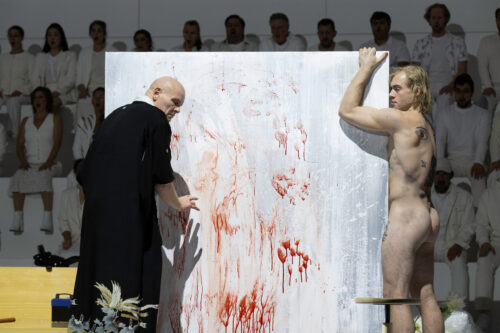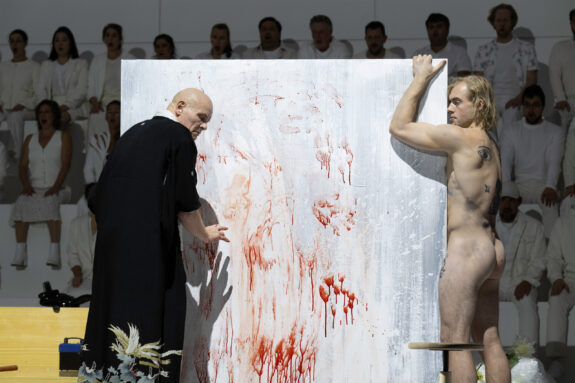 Switzerland Alfred Schnittke, Life with an idiot: Soloists, Extras Association of Zurich Opera, Zurich Opera Chorus, Philharmonia Zurich / Jonathan Stockhammer (conductor). Zurich Opera, 3.11.2024. (MF)
Switzerland Alfred Schnittke, Life with an idiot: Soloists, Extras Association of Zurich Opera, Zurich Opera Chorus, Philharmonia Zurich / Jonathan Stockhammer (conductor). Zurich Opera, 3.11.2024. (MF)

Kirill Serebrenninkov’s renders an intensely physical staging of Russian composer Alfred Schnittke’s 1992 opera Life with an idiot (Leben mit einem Idioten), delivered by a phenomenal cast. Not your easy night out, but a momentous performance well worth the visit.
Punished for lacking compassion, the main character ‘I’ (Ich) is ordered to live with an idiot. I goes to choose his idiot in a lunatic asylum and brings him home. He and his wife are congratulated by their partying friends on the excellent choice of an idiot. It all continues to go rather well at first and I is pleased with his handling of the punishment. The idiot appears to fit in well, even if he refuses to speak other than constantly uttering the syllable ‘Eech!’. Things start turning sour when the idiot defecates in the couple’s living room and starts a relationship first with Wife – resulting in the conception and subsequent abortion of a child – and then with I. Sex, violence and anarchy spiral out of control, culminating in Wife’s death as she is killed with hedge shears.
At the request of Schnittke, his fellow countryman Viktor Yerofejev created the libretto for this operatic drama based on his own short story by the same title. Originally written in 1980, the story was intended to mark the 110th birthday of Lenin. The idiot’s name is Wowa, short for Vladimir. He is a red-haired enthusiast of folkloristic music. That this is a parody of the mummified revolutionary and intrusive Soviet state power is not difficult to recognize. The story could not be published officially in the Soviet Union until 1991. Schnittke’s and Yerofejev’s collaboration on Life with an idiot was a first for both of them, neither had worked on an opera before. Their musical drama premiered in Amsterdam in 1992 under the baton of Mstislav Rostropovich.
In this Zurich production, Russian director Kirill Serebrennikov eschews references to today’s dictatorial Vladimir Putin. He deliberately leaves aside the explicitly political, reading the piece as an illustration of the tipping point when the irrational takes over. In reply to the obvious question, Serebrennikov explains that his production is not meant to become a work about Putin, replacing the original that took on Lenin. The idiot is within us all. Our rational minds are complemented by artistic creativity and wrestle with the uncontrolled drive for destruction. The idiot embodies them both.
Serebrennikov has good reason to resent the Russian state. In 2018, just as he was embarking on the rehearsals for Così fan tutte in Zurich, Putin had him condemned to strict house arrest in Moscow on fabricated allegations of embezzlement of state funds. Zurich Opera then decided to go ahead anyway, communicating with the captive director through videos and emails which had to be sent via his Moscow lawyer. Serebrennikov was, by now, living in exile in Berlin.
This time, the artist is present – and how! Emphatically embracing the ‘invitation to create’ as Schnittke described his score, Serebrennikov enacts a vertiginous psycho thriller. As is customary in his work, Serebrennikov not only directed (with Evgeny Kulagin) but also created the set (with Olga Pavluk) and the costumes (with Tatiana Dolmatovskaya). Set and costumes are contemporary and achromatic. White, beige, grey and black dominate, occasionally slashed with shrieking red elements. The stage is a wide gleaming white cube with a three-row grandstand on which the strongly staffed choir is seated for almost the entire 105-minute non-stop production. The white cube serves as asylum, I’s office, the couple’s apartment, bedroom and their bathroom.
The director tests the performers’ limits, evoking a serendipitous echo to the Marina Abramović retrospective currently on show at nearby Zurich Kunsthaus. The opera’s nonlinear plot is told several times over from different perspectives allowing for a multi-faceted approach to the story and the characters.
Somewhat unusually perhaps, Serebrennikov came to enjoy Schnittke’s music as a child and first associated this opera’s score with punk rock. The composer himself labelled it as ‘polystylistic collage’, and rightly so. Next to the expected tonal and atonal elements, there are snippets of Bach’s St. Matthew Passion, waltzes, revolutionary songs, the ‘Socialist International’, the famous ‘Song of a Birch Tree’ and a tango which Schnittke had originally composed for a film score. The music supports, mirrors and complements the stage performance’s intensity, affording the audience little time to rest.
As Serebrennikov put it in the programme notes, it takes an extraordinary cast to stage this production. Danish baritone Bo Skovhus as I, German-Danish coloratura soprano Susanne Elmark as Wife and American tenor Matthew Newlin as the Idiot are the trio of main characters. They keep the energy flowing for the entire evening. Skovhus and Elmark, both with gargantuan parts, deliver a veritable tour de force. Skovhus is bald, of bespectacled average corporate looks; he oscillates between ordinary normality, tender reserve and riotous madness. Elmark, with an immaculate blonde scandi-chic coiffure, is emotionally touching, both in her introspection and forceful vocal explosiveness. Together, they impress as a couple with a kaleidoscope of emotional range.

The idiot’s text consists of just one word (the ‘Eech!’) which throughout the entire opera is varied over three octaves. Newlin makes a memorable role debut, dazzling with an array of interpretative options. To increase the emphasis on the idiot’s irrationality, Serebrennikov splits the role in two, the singing part (Newlin) and a silent actor/dancer of exceptional carnal mobility (Campbell Caspary). The effect is striking. Caspary, mostly naked, opens a physical dimension rarely experienced on an opera stage. At one point I squeezes in between Wife and the Idiot standing closely face to face. The image recreates the famous Imponderabilia performance by Marina Abramović and her then partner Ulay.
Magnus Piontek as the Guardian is solid but slightly eclipsed by the three main protagonists. To conclude, the cast of characters includes Marcel Proust, whose work Wife is infatuated with. The role’s significance remains cryptic. Should we think of Proust’s mémoire involontaire as code for the multi-layered story telling? Serebrennikov seems at a loss, too, as he pictures the writer as a Marcel Marceau-like pantomime figure. Birger Radde makes as much as he can of his part.
This review would be incomplete without a specific mention of Mykola Pososhko. The twelve-year-old Ukrainian violinist has a solo appearance playing a tango melody. We will never know if he is I as a child (as the dramatis personae suggests) or the son the couple wished for but never had. Either way, Mykola’s short recital is deeply touching.
The Zurich Opera Chorus is the fourth main character that remains on stage nearly the entire evening. From the stairs at the back of the stage, the choir acts like a mirror of the auditorium, commenting on the unfolding plot as in a Greek tragedy and taking part in the action. As a parenthesis, the choir opens and closes the evening. The ensemble renders an impressively versatile performance, acting as much as singing. Chorus directors Janko Kastelic, Johannes Knecht and Ernst Raffelsberger rehearsed for a year and a half, and it paid off.
Contemporary music specialist Jonathan Stockhammer conducts the Philharmonia Zurich. Conductor and orchestra bring to life a fiendishly complex score with clarity, precision and wit.
The evening leaves the audience with a wealth of impressions, images and thoughts on the nature of love, violence, self-perception, our relationships or art itself. The applause for crew and cast was rapturous.
Performances run until 1 December 2024.
Michael Fischer
Production:
Director, Set and Costumes – Kirill Serebrennikov
Co-Costume designer – Tatiana Dolmatovskaya
Lighting designer – Franck Evin
Video designer – Ilya Shagalov
Choreography and Assistant Director – Evgeny Kulagin
Co-Set designer – Olga Pavluk
Masks – Shalva Nikvashvili
Chorus masters – Janko Kastelic, Johannes Knecht, Ernst Raffelsberger
Dramaturgy – Beate Breidenbach, Daniil Orlov
Cast:
I (Ich) – Bo Skovhus
Wife (Frau) – Susanne Elmark
Idiot – Matthew Newlin
Guardian – Magnus Piontek
Marcel Proust – Birger Radde
Idiot / Double – Campbell Caspary
Ich as child – Mykola Pososhko
